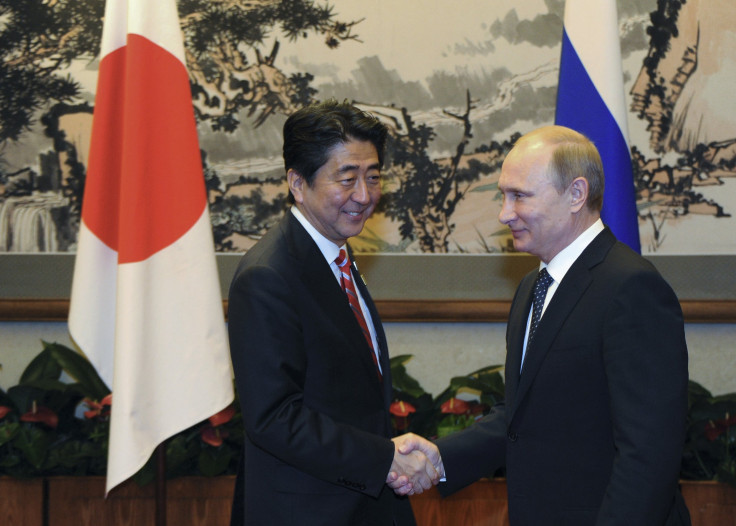Japanese PM Shinzo Abe To Meet Russian President Vladimir Putin To Mend Strained Ties

Russian President Vladimir Putin will meet Japanese Prime Minister Shinzo Abe in the Black Sea resort of Sochi, Russia, Friday. During the rare bilateral meeting, the two leaders are widely expected to discuss a 70-year-old territorial dispute that has been a source of persistent tension between Russia and Japan.
“The current situation and prospects for developing bilateral relations in trade, the economy and humanitarian sphere will be subjects of discussion at the upcoming talks,” the Kremlin said in a statement released last week. “The leaders of Russia and Japan are also to hold an in-depth exchange of opinions on topical international issues.”
The territorial dispute between Russia and Japan dates back to the end of World War II, when Soviet troops seized four Pacific Islands — called the Southern Kurils by Russia and the Northern Territories by Japan.
While Japan has consistently called for the return of all four islands, the erstwhile Soviet Union, and the present-day Russian government, has only been willing to give up its claims over two of the smaller islands.
As a result of the festering dispute, the two countries are yet to sign a peace treaty to formally end World War II-era hostilities.
“This issue is complex and not just one meeting or one round of consultations at the level of the foreign ministries will be required to reach mutually acceptable settlement,” Putin’s chief aide Yuri Ushakov said Thursday, adding that the issue would be discussed during Putin and Abe’s meeting. “But in order to make progress in solving it, it is necessary to create a positive, constructive atmosphere of bilateral relations, which could bring both sides closer to each other rather than move them farther away from each other in solving the problem.”
Ties between the two nations also have been eroded by Russia’s annexation of Crimea in 2014. According to some reports, U.S. President Barack Obama had, in February, urged Abe to postpone his trip to Russia until the resolution of the crisis. Japan — a staunch U.S. ally — is also one of the countries that has imposed wide-ranging sanctions on Russia in response to the annexation.
However, despite the sanctions, Russia still supplies nearly 10 percent of oil and gas consumed in Japan.
The meeting comes at a crucial time for Abe, who has, since taking office in 2012, made mending ties with Moscow a key priority. Friday's tête-à-tête would mark the 13th time Abe is meeting Putin.
Later this month, Japan is scheduled to host the G-7 summit, which would be attended by Obama and where Russia’s ties with the West are likely to be a key discussion point.
“This is the worst possible time for going soft on Russia,” James Brown, an associate professor at Temple University in Tokyo, told Bloomberg. “Abe is taking a very big risk because other G-7 members have made it very clear they don’t think it’s a very good idea, including Obama on a phone call.”
© Copyright IBTimes 2024. All rights reserved.












